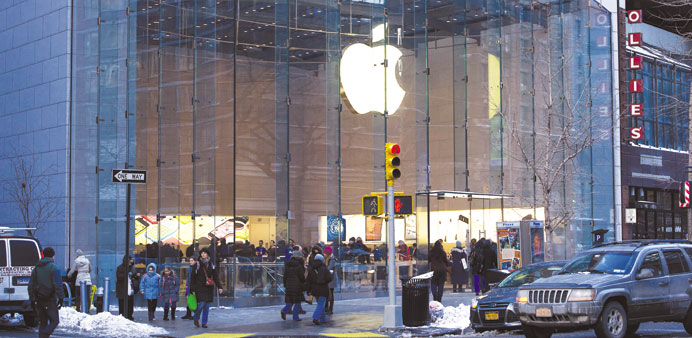Pedestrians pass in front of an Apple store in New York. Apple was added to the Dow Jones Industrial Average, ending a banishment that kept the world’s largest company out for years before a stock split made its shares palatable to the price-weighted measure.
Bloomberg/New York
Apple was added to the Dow Jones Industrial Average, ending a banishment that kept the world’s largest company out for years before a stock split made its shares palatable to the price-weighted measure.
The changes will push the number of technology-related companies in the 30-member gauge to six and boost their influence even more as Apple joins Microsoft Corp, Intel Corp, International Business Machines Corp, Cisco Systems and Visa. AT&T is being kicked out after falling 4.5% in 2014. The changes will take effect after the close of trading on March 18.
“The Dow is supposed to be the dominant companies in each different sector of the economy and I don’t think anybody can argue that Apple isn’t by far the dominator in the phone sector,” Michael Chadwick, who manages $150mn as chief executive officer of Chadwick Financial Advisors in Unionville, Connecticut, said in a phone interview. “The digital age is taking over. It’s going to be a function of those who can adapt and change.”
The Dow average’s weighting methodology, which links a stock’s influence to its share price, had long barred Apple from joining the gauge. The timing of Apple’s addition hinged on not just its own 7-for-1 split last June but also Visa’s 4-1 split scheduled for March 19 of this year, according to David M Blitzer, managing director and chairman of the Index Committee at S&P Dow Jones Indices.
Stocks in the index are selected by a committee of Wall Street Journal and S&P Dow Jones Indices representatives based not on quantitative rules but on the companies’ reputation, relevance to investors and growth record.
“As the largest Corp in the world and a leader in technology, Apple is the clear choice for the Dow Jones Industrial Average,” Blitzer said in a statement. Apple’s split brought the stock price closer to the median price in the Dow and the Visa split will reduce the technology weight and make room for Apple, Blitzer said.
“The DJIA is price weighted so extremely high stock prices tend to distort the index while very low stock prices have little impact,” Blitzer said.
The original American Telephone & Telegraph entered the Dow in October 1916 and was taken out in April 2004. The company removed today was created in the merger of SBC Communications and AT&T in November 2005. The removal announced today will leave Verizon Communications as the only telephone stock in the Dow.
“There’ll be some surprise that AT&T is the name that’s being removed and Verizon is being kept,” Michael James, a Los Angeles-based managing director of equity trading at Wedbush Securities, said in a telephone interview. “From the historical standpoint, AT&T represents an American institution. To see that leaving the Dow is somewhat of a psychological blow. In terms of impact on the stock itself I don’t think it’s going to be overly significant.”
Charles H Dow, the co-founder of Wall Street Journal publisher Dow Jones & Co, devised the Dow average in 1896 to provide a clear view of the stock market and “barometer of the times,” according to the S&P Dow Jones Indices website. It originally included American Tobacco, General Electric Co and 10 other companies before expanding to 20 companies in 1916 and 30 in 1928.
Apple’s Dow entrance makes it only the second among the three largest US companies by market capitalisation to be included in the gauge. Class A shares of Google, the third largest US company, closed at $581.44 on Thursday, effectively making them too expensive for inclusion in the Dow average even after what amounted to a 2-for-1 stock in April of 2014.
The last Dow reshuffling took place in September 2013 when Goldman Sachs Group, Visa and Nike replaced Bank of America Corp, Hewlett-Packard Co and Alcoa. The changes boosted the influence of financial-related companies to five.
At $126.41, Apple’s shares will get the sixth-biggest weighting in the gauge, with a 4.3% share, according to data compiled by Bloomberg. AT&T was the fourth-smallest stock, priced at $34 with a weighting of 1.2%. Goldman Sachs will have the highest weighting following Visa’s split and Apple’s addition, based on current share prices.
There is more than $7tn benchmarked to the S&P 500, with index assets comprising approximately $1.9tn of the total, according to S&P Dow Jones’ web site.
Only about $32.8bn was directly indexed to the Dow at the end of 2013, according to Dave Guardino at S&P. “It’s not going to change anything,” Andy Hargreaves, an analyst covering Apple at Pacific Crest Securities in Portland, Oregon, said in a phone interview. “I couldn’t tell you the last time I thought about the Dow Jones Industrial Average and what it means for its constituent stocks. It has a kind of social significance, meaning the companies in it are old, and that’s the whole idea.”

